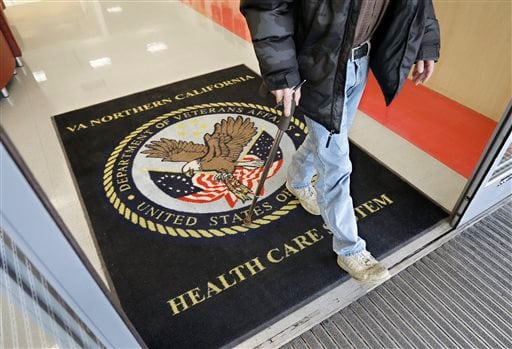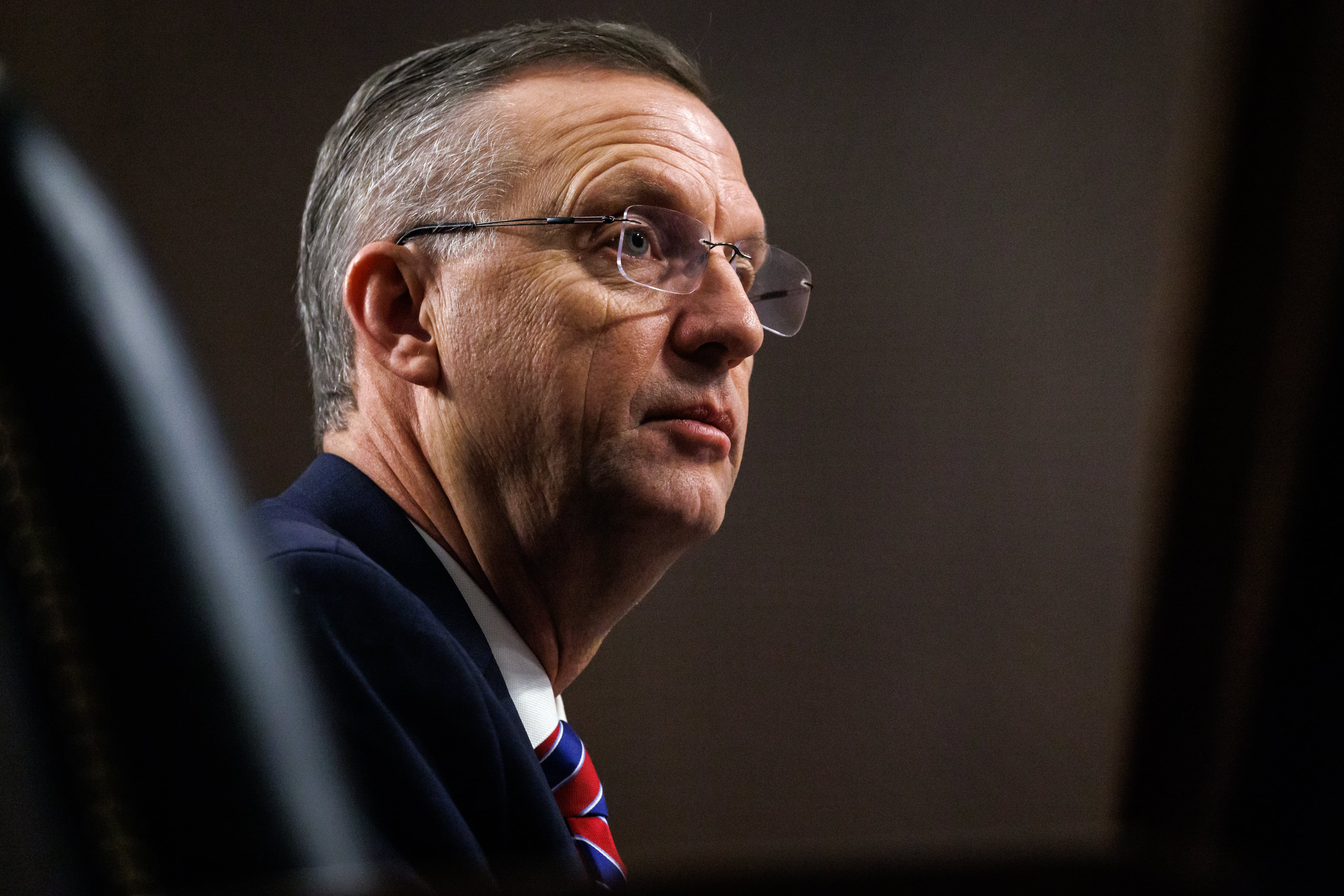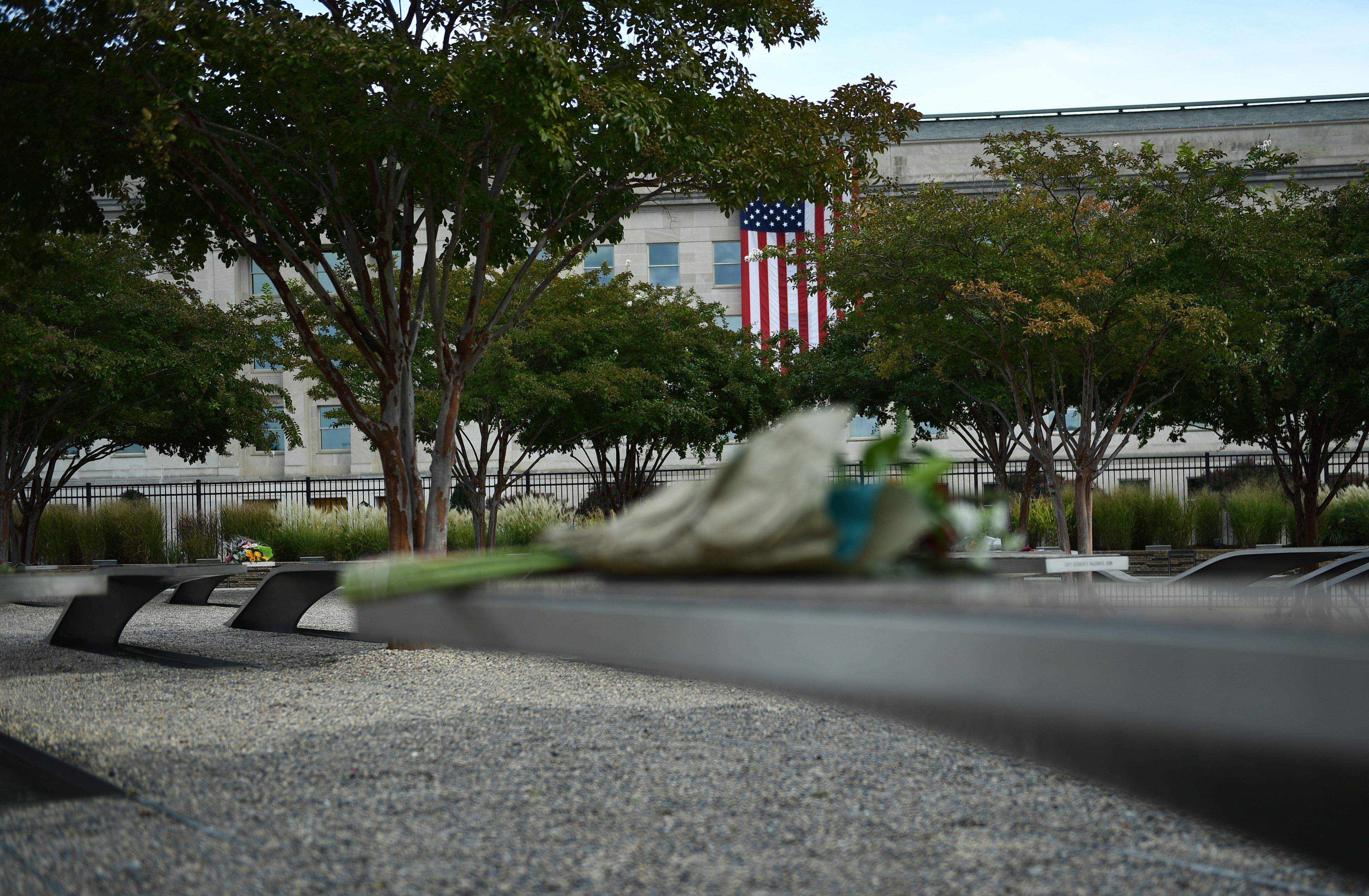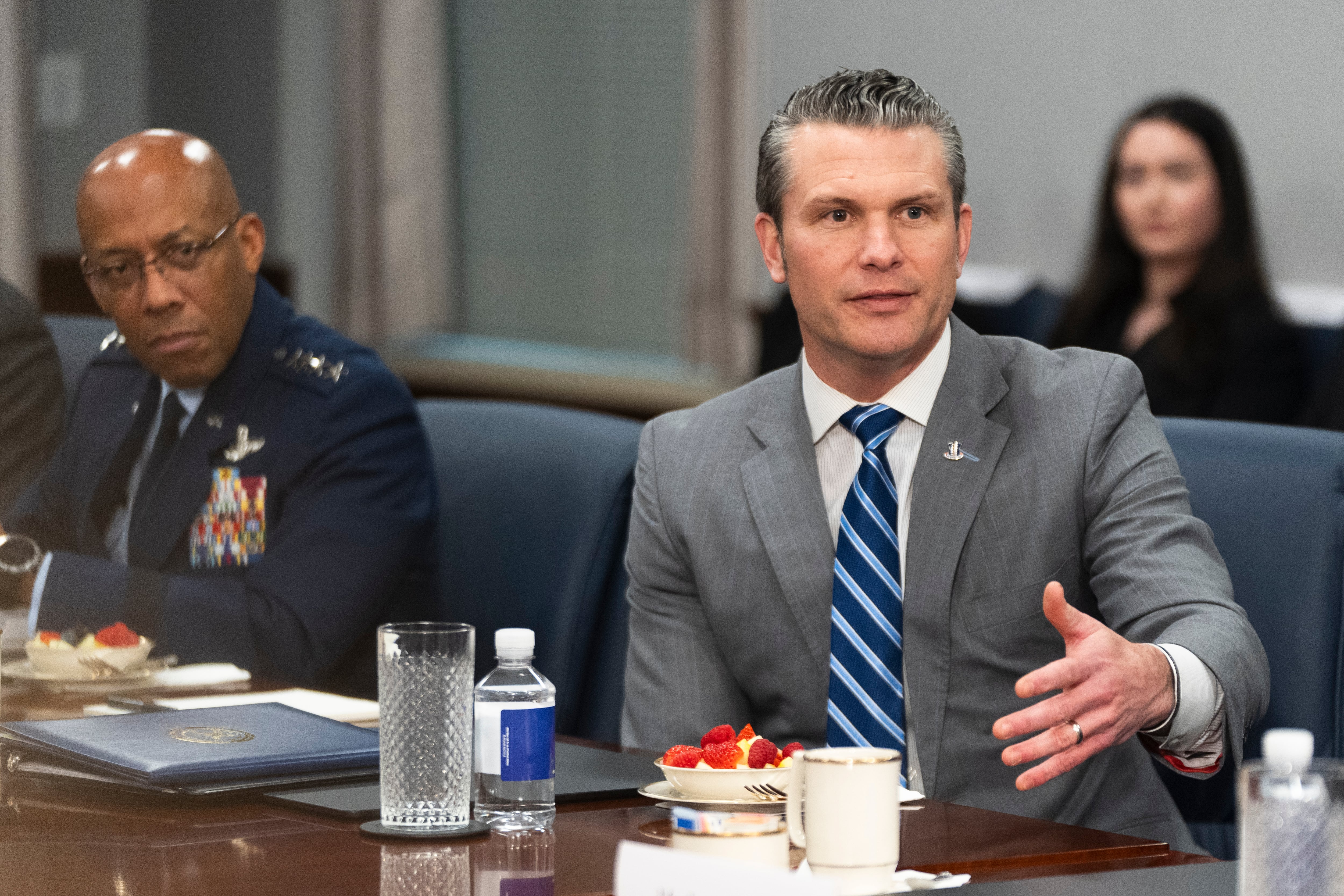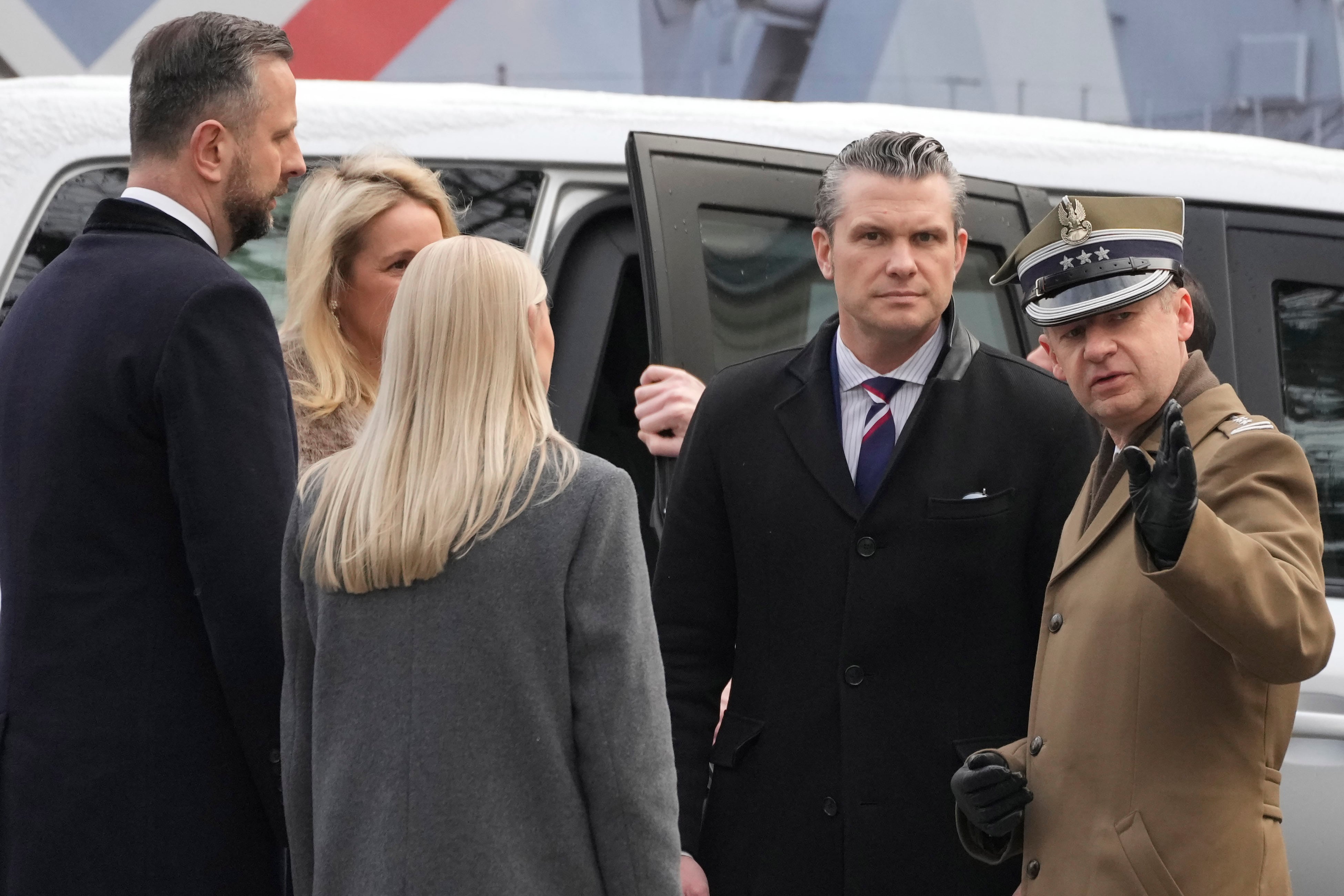Gen. Robert Neller has not wasted any time since becoming commandant of the Marine Corps on Sept. 24.
Last month, he released his vision for the next four years — a fragmentary order to the planning guidance released in 2015 by his predecessor, Gen. Joseph Dunford. NellerHe ordered a full review of the service’s fitness standards and plans to release a revised version of the Marine Corps’ tattoo policy soon. Neller is also looking to develop more effective strategies for combating suicide among current and veteran Marines.
Meanwhile, he is intent onlooking at ways to prevent current and veteran Marines from committing suicide while keeping the force focused on being ready to deploy and fight wherever and whenever it is asked to do so.
In his first interview with Marine Corps Times as commandant, Neller talked about how he plans to make Marines physically and mentally tougher and what Marines can expect from him as their leadercommandant. Though he declined to talk specifics about gender integration issues following a call from Navy Secretary Ray Mabus to make Marine boot camp co-ed, he did say the Corps’ plans to set everyone up for success as they move toward moving qualified female troops into ground combat roles.
Excerpts of the interview, edited for clarity and space.
Q. You stressed in the FragO that and the Marine Corps needs to ensure it's retaining its most capable leaders. What prompted you to make that a top priority?
A. I think it has always been a priority, but I felt it was important to say it. We have for the most to retain and promote the best people with the right qualities.
We have a very talented force and we want commanders to understand that we have an obligation to talk to our Marines and encourage those we think are most effective to stick around. Everybody has options. I have found that one of the most effective ways to get a Marine to stick around is to ask them.
Q. How will that change promotion or retention processes?
A. We are going to put more pressure on commanders to be involved with retention. We are all recruiters, we are all career planners. I am always talking to Marines about staying, from colonels and generals to lance corporals.
I was talking to a sergeant in the gym this morning who says he is getting out. I asked him, "What would it take to get you to stay?" That made him pause for a second, so I am going to re-attack that later.
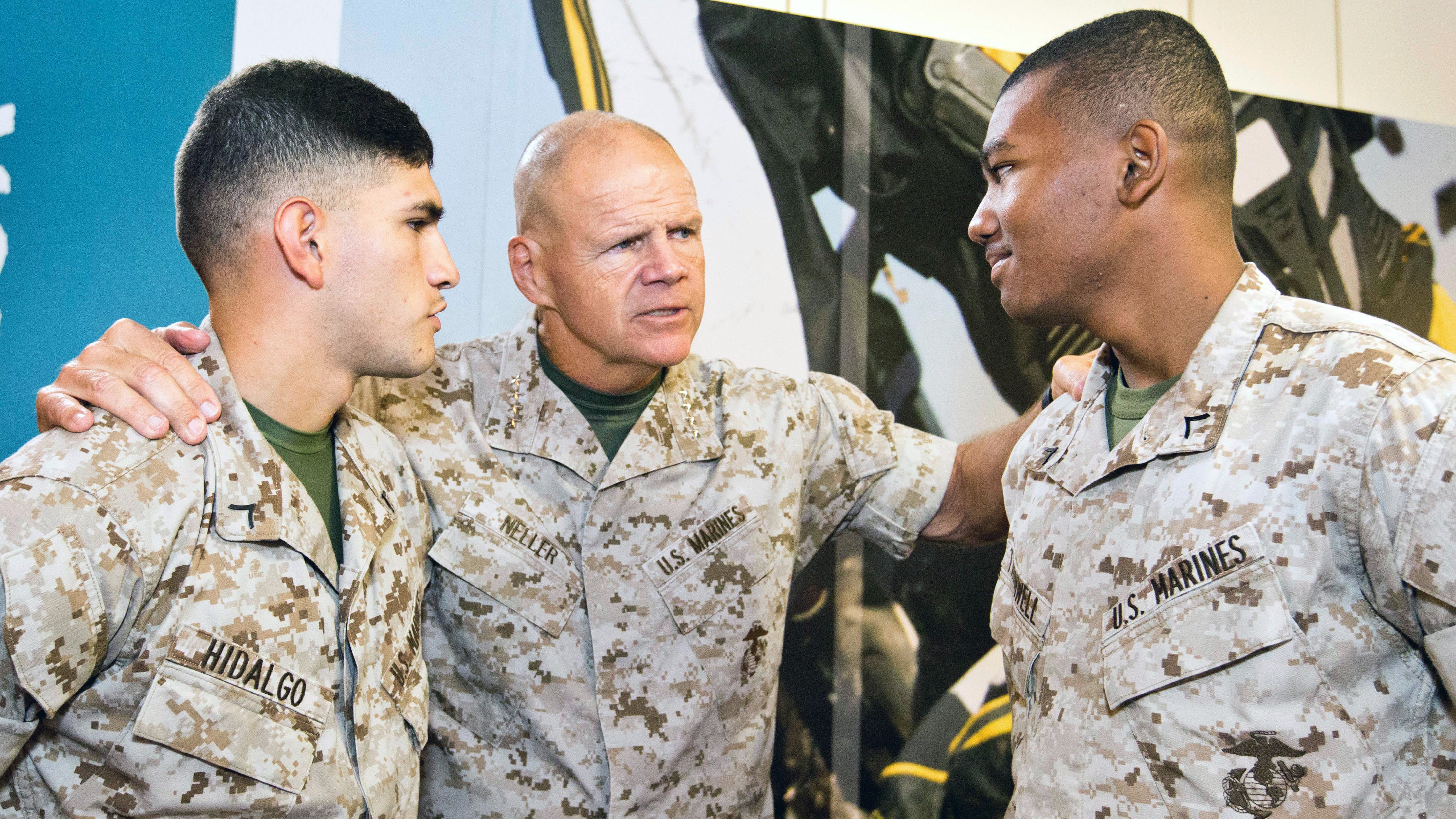
Commandant Gen. Robert Neller, speaks with Marines at Marine Corps Base Quantico, Va., in October.
Photo Credit: Sgt. Gabriela Garcia/Marine Corps
Q. Retention intent has been down in some areas. What challenges does the Corps faces in keeping good Marines?
A. When you have a very talented force, which we do — very smart, fit, resilient and experienced — there are other opportunities. Unemployment is down and you have the post-9/11 GI Bill, which is a great opportunity.
We cannot take anything for granted. This is a tough life, so I think we need to exert more effort to be sure they understand that we want them to stay and we appreciate their efforts.
Q. Your FragO also details new promotion review boards for lance corporals and corporals. What will that entail?
A. When I came in the Marine Corps a long time ago, you would appear in front of your unit officers and staff noncommissioned officers and get asked some questions about whether you were qualified for promotion. That kind of went away, so the intent here is to work on a promotion review panel. The Marine will go before the board and review their marksmanship and fitness scores and talk about work performance and professional military education.
That gives the chain of command an opportunity to see everybody. The goal is not to deny people a promotion, but just to make sure everybody understands we all have equity in the process. It codifies existing processes and formalizes it. I think everybody wins.
Q. What do you hope Marines gain from this new process?
A. Most Marines I have talked to are excited about it because they were like, "Hey, I am ready. I will go in front of any board, ask me anything you want."
I think it will make them understand becoming an NCO is not something that is just happens. And I think it will be good for their mentors, too, because if I am your sergeant, I want you to go to the board and do well. So I am going to sit down with you and say, "OK, let’s talk about what is going to happen at the board." I want leaders to talk to their Marines, and this is just another venue to do that.
Q. Speaking of manpower, there's a section in the FragO that states the Corps "will be willing to accept risk in the size and organization of our units in order to create the capabilities we need for the future." Can you elaborate?
A. As we expanded the force to the wartime high of 202,000 Marines, we grew some capabilities that we needed, like explosive ordnance disposal and civil affairs. Now as we look at future threats, there are certain things that I'm not sure we have enough of, like cyber, information operations or electronic warfare.
If we indeed need to make more of those types of Marines but aren't going to expand the size of the Corps, there are two ways to do that. We can cut units or make some of the units that we have smaller. But the first thing we need to do is identify the capabilities and numbers we need, and then we will figure out where we might have to accept some risks in other units to move toward that structure.
Q. Could that mean certain fields might become more competitive as you move to build up others?
A. It could. But it could also mean an opportunity for Marines to move into these other fields.
Q. You mentioned electronic warfare — is that a response to what the U.S. has seen the Russians doing in Eastern Ukraine?
A. I think partially. We have been very effective on the battlefield for the past 14 years, but as we look around and see what other capabilities are being developed, I think we need to take a look at that.
In the past, we have pretty much assumed that our communications, Internet and GPS would work, that the grid or our radio communications would not be contested. But we cannot find out on the battlefield that things have changed, and not change – we have to anticipate what these changes are going to be.
Q. The FragO also mentioned the need to reduce the number of non-deployable Marines. Will the Corps move to separate more Marines who are injured or who cannot past their physical fitness tests?
A. There's no more effort now than before to separate more Marines. All I am trying to do is make commanders understand that the best way to reduce the number of non-deployable Marines is to keep people from getting hurt or from being unsuccessful.
Don't get me wrong, Marines are incredibly well-behaved. Nobody joins the Marine Corps to be unsuccessful, so if somebody gets into some problems because of alcohol or drugs or some sort of legal thing, nobody is happy about that. We need everybody full-on ready to go. I tell Marines that my basic definition of success is that they come here, do their four years, get honorably discharged, get that $80,000 scholarship in their pocket and go do something.
Q. You started Protect What You've Earned after learning that a Marine had been killed, allegedly by another Marine who'd been drinking. What should Marines expect from Protect What You've Earned?
A. I am not going to tell Marines not to drink — I trust them. But the death of 1st Lt. Matthew Davis was just such a tragic, sad story. That was the moment I decided I can't be a bystander anymore on the alcohol issue.
We know statistically when you look at things like accidents, sexual assault, suicide, drug use or domestic abuse that alcohol is a significant player in a lot of this. My hypothesis is if I can get Marines to be more responsible with alcohol, then these other things will go down.
Again, I am not telling Marines not to drink. They are grown men and women. But I am not sure how effective it has been over the years to stand in formation and wag our finger at them. Instead, the idea is to say, "Hey, you have worked really hard, you have accomplished a lot, you are a United States Marine. Your family is proud of you, you have done great. Do you really want to put that at risk just over a beer?"
Q. So what do you say when Marines respond with, "Hey, we were born in a bar?"
A. It doesn't mean you have to die in one.
Marines are smart, logical, focused and mission-oriented. I am not preaching, I am just having a conversation like I would with anybody that I care about. There is no class, there is no computer program, no class roster. It's just the idea of protecting what you've earned because Marines are successful people and this is all about success — whether on the battlefield, in their career or in their lives.
Q. Do you worry that the Marine Corps has a problem with alcohol?
A. I think society has a problem with alcohol because I don't think people respect the drug. It's a habit just like anything else, and everyone has to make their own decisions on that. I am just suggesting that they have a discussion about it.
Q. You recently ordered a full review of Marine fitness standards. What prompted that?
A. In going around talking to Marines, there were a number — particularly female Marines — asking about height and weight standards. They were saying, "Hey I have been working out and doing pullups and I am over my weight for my height; when are you going to make a decision on whether women do pullups or not?" Or, "I can get this PFT score, but I am still above my weight for height."
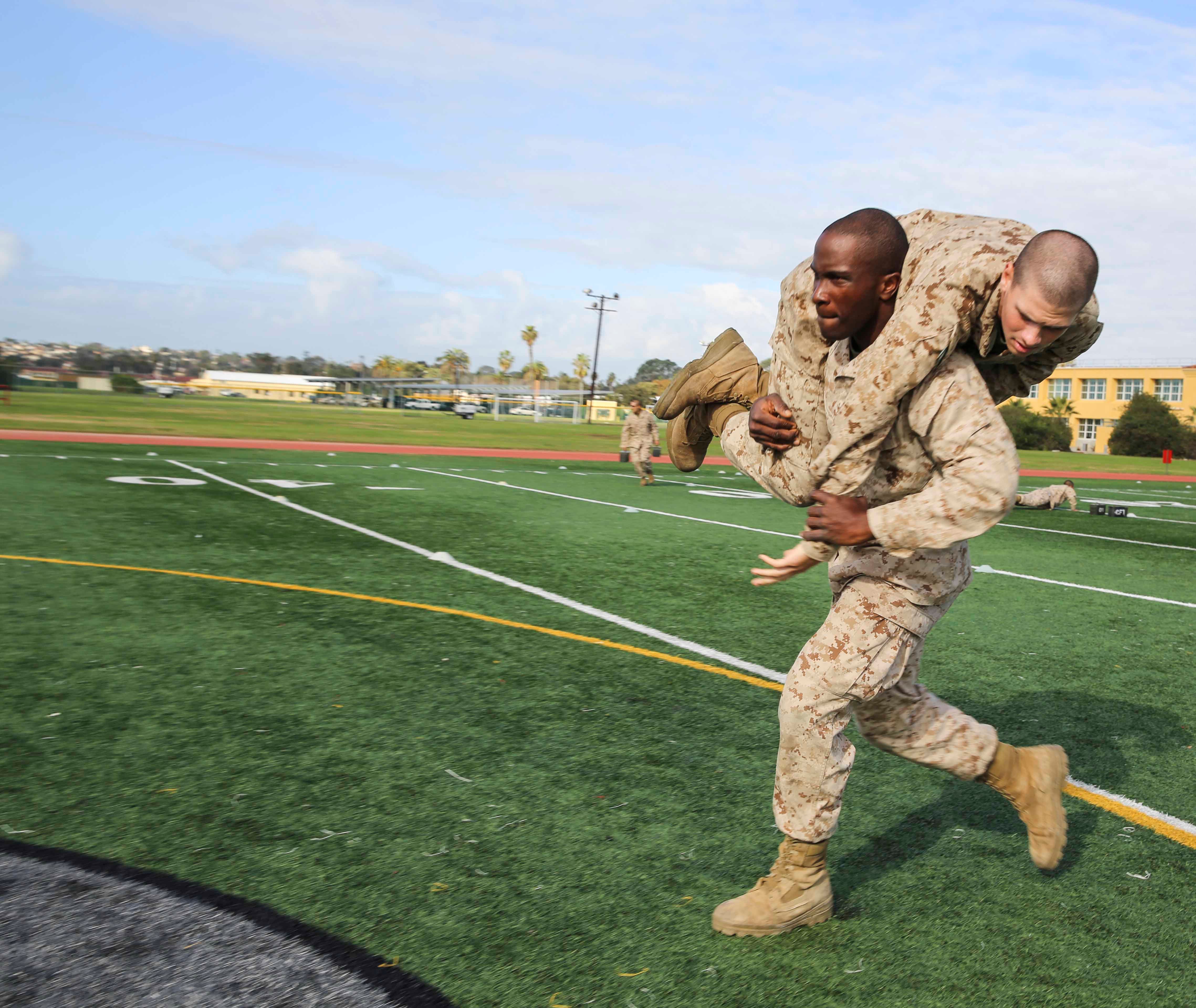
A Marine recruit conducts a fireman carry while completing the Combat Fitness Test.
Photo Credit: Cpl. Jericho Crutcher/Marine Corps
Q. So what is the fitness review examining?
A. We have not looked at the science out there on whether people are bigger and stronger now. If so, do we need to look at our height and weight? Do we need to look at the body fat? Do we need to look at how we measure body fat?
The gender integration study that we did shows that to do if you are of a certain size, you are advantaged when it comes to certain tasks. If you are small, you are disadvantaged. Marines are big. There are some monsters out there, and I want them to stay. Nobody likes to get taped or all that stuff.
Q. What aspects opf the physical and combat fitness tests might be changed?
A. Is the test right? Should we do something else? Should we run farther? Should it be shorter? Should we do the CFT another way? I mean I have all sorts of ideas, but I am going to wait for the [Training and Education Command] guys to come back and tell me what they think.
I certainly do not think it is going to get any easier.
Q. How might Marines' fitness tests get harder?
A. I'm not a physical education major, but I know enough that if you want to increase the difficulty level, you have to go faster, lift more weight or increase the intensity. In other words, you have got to do more work within a shorter period of time.
So on the CFT, you get at least five minutes between the three events. What if we change that to four minutes? Now it just got harder.
Q. Your FragO talks about putting force fitness instructors at the unit level. What role will they play?
A. When you go to the rifle range, you have your primary marksmanship instructor. When you do martial arts, you have a certified martial arts instructor.
The idea with this is that your commander would have somebody who is trained/certified to design a fitness program for each unit. Whether it is going to be a primary duty or collateral duty, we are still in discussions about that. But it would be an NCO: somebody that we are going to get trained and who understands how to train, how to prevent injury, increase our overall fitness, and work with Marines who might need a little extra help in a particular area.
Q. How would that help improve Marine fitness overall?
A. I think we do a decent job at our schools on fitness. I think we are a little less scientific than we need to be in the operating force, and that is really my target. Some units do a great job, some units could probably use a little help, and I think it is a proper role for NCOs to be out there advising.
At the end of the day, whether it is a collateral or primary duty, we'll have somebody assigned — at least at battalion and squadron level — who's there to help the operations and commanding officers develop a fitness program for that unit that is functionally based, can help them meet the standards and hopefully reduce injury.
Q. What can you say about where the Marine Corps stands on its April 1 deadline for full gender integration?
A. We've submitted our plan. I think we have a good plan. I think our plan and the way we're going to go forward on this is going to set everybody up for success. We believe that the processes that exist are solid and good, but that does not mean that we can't improve.
Q. The Navy secretary recently called on the Corps to fully integrate its entry-level training, to include boot camp. What can you say about the decision to continue training male recruits separately from women?
A. Navy Secretary Ray Mabus has his view, and I respect his view. We have been talking to him and I think we are having a good solid exchange of our views and how things should go.
Q. Marine leaders began a review of the Corps' its tattoo policy nearly a year ago. Where does that stand?
A: Right now, Marines have to go look at three or four different documents on the policy. We are going to try to get it down to one document. We are also going to try and provide pictures to clarify what we mean when we say things like "a quarter of a body part can be covered."
We are not going to approve sleeve tattoos. There will be a little flex on what is an acceptable tattoo. My goal is, in less than thirty days, this thing will be out, and it will include specific rules for Marines who want to do special duty assignments or become warrant or commissioned officers.
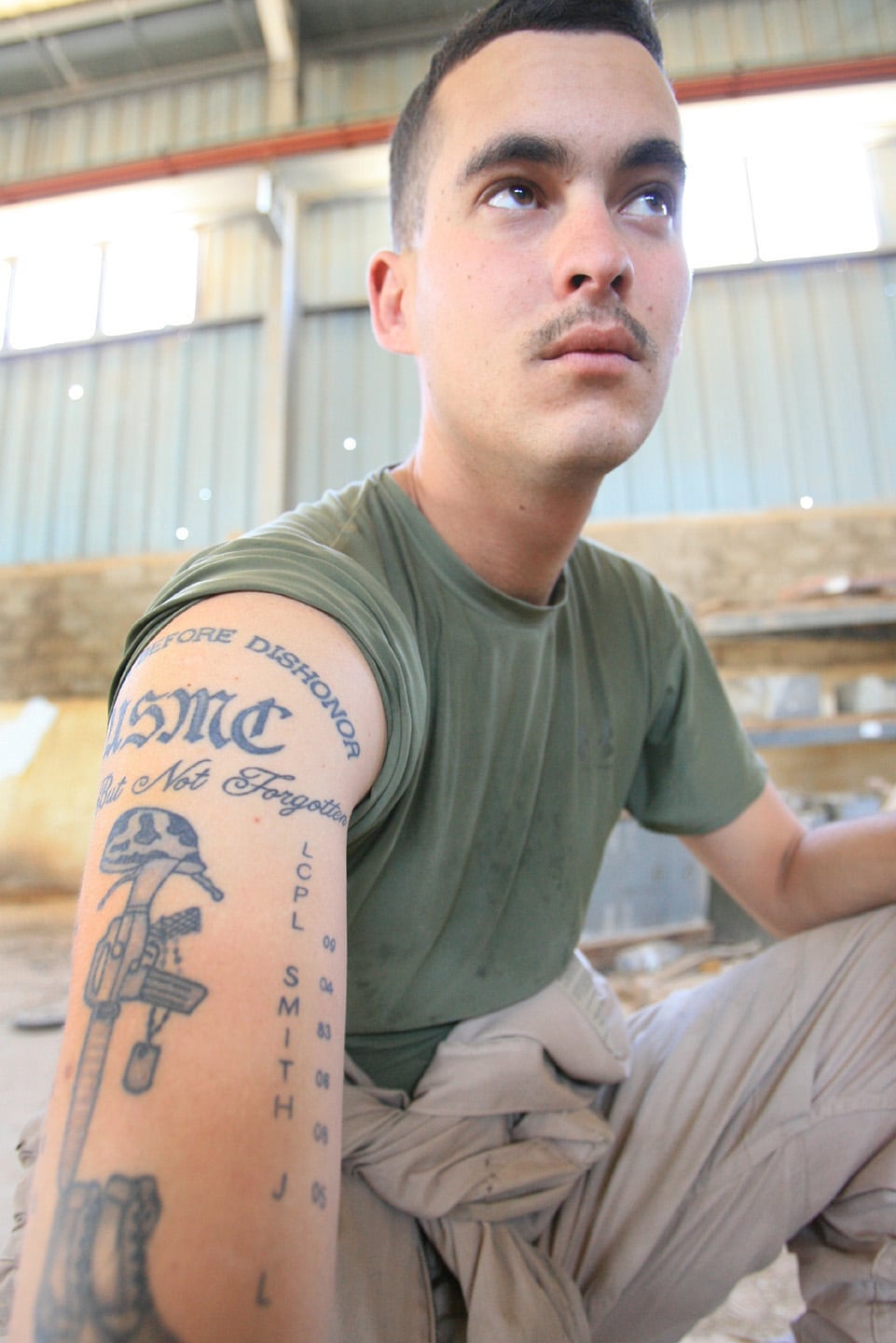
A Marine displays the tattoo he got in memory of his friends and fellow comrades.
Photo Credit: 1st Lt. Nathan Braden/Marine Corps
Q. What kind of questions do you get from Marines about tattoos?
A. I believe most Marines do not really understand what the policy is. I do not think they understand what they can do. Most of the Marines that ask me want to be able to get a sleeve tattoo. I ask them why and they say that they want to memorialize a friend, and I respect that.
Marines don't ask for much, so when you can, you want to give them something. At that other end, I say, "Look, we are not in a rock and roll band. We are Marines. We have a brand. People expect a certain thing from us."
A lot of Marines are also interested in law enforcement, and if you talk to state, local and federal police, they are pretty strict on this.
Q. Your FragO references a Marine for Life program. How do you hope to see the Marine Corps do more to prevent suicides?
A. We are trying to get Marines to understand — and I think most do — whether you like it or not, you are a Marine for life. We all have an obligation to help each other.
Marines stay connected on social media, and even if someone's out of the Marine Corps, their squad leader never stops being their squad leader — and I still hold them accountable for their Marines. I think they try to help if one of them is in trouble, so then it's my job to figure out how to give them the tools to do so.
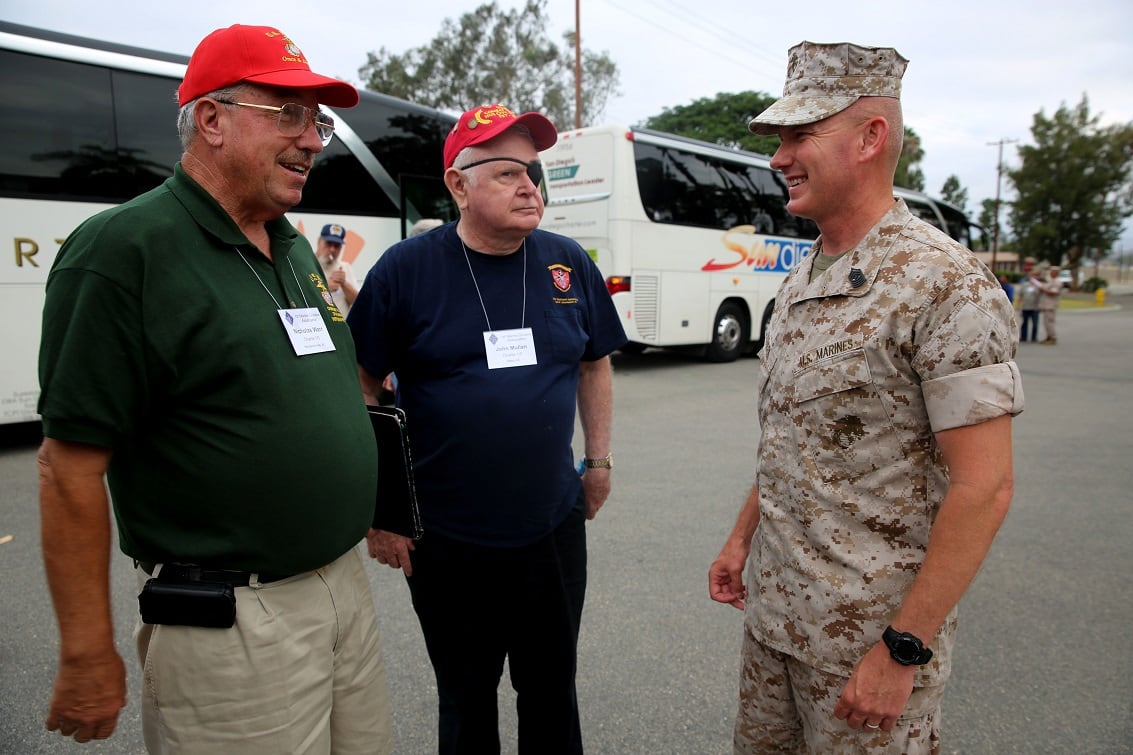
Sgt. Maj. William Sowers, the top enlisted leader with 1st Marine Division, speaks with two Vietnam veterans during an annual reunion at Camp Pendleton, Calif.
Photo Credit: Cpl. Demetrius Morgan/Marine Corps
Q. What can the Corps do to help?
A. Units tend to do reunions, but we are trying to facilitate more of that this year. We are just going to encourage people to stay connected. That is the best way to help each other because they trust each other.
There are tons of local resources and organizations out there that want to help. We need to figure out how to connect them to a Marine who, for whatever reason, is having a hard time out there. The VA does as good a job as they can, but we have to help each other.
Q. What can Marines expect from you as their commandant?
A. I will listen. I want to hear what they have to say, I really do — good, bad or otherwise. I will do my very best to represent them and ensure they have what they require — maybe not what they want all the time — but what they require to not only do their mission but to live their lives in a successful way and that their family needs are met.
Q. How would describe your leadership style?
A. I will show up every day and try to be as confident as I can be. I am going to study my profession and try to get better. I am going to listen and be compassionate because I know everyone makes mistakes. But at the same time, we have a mission and Marines have got to hold up their end of the deal — and I am confident they will. I've got to prove to them that I am going to hold up mine, too.
I trust them and I have to earn their trust every day in everything I do.

